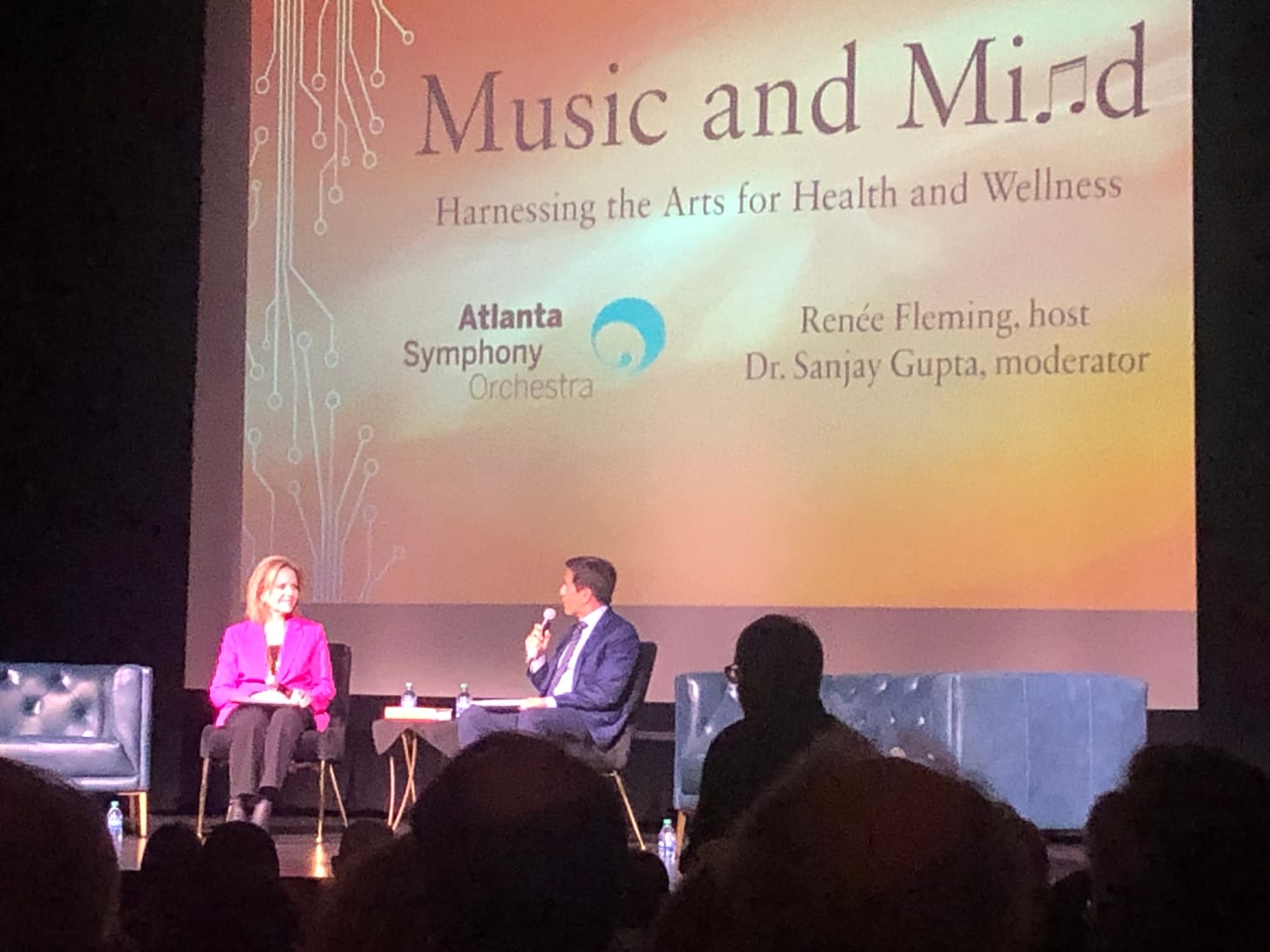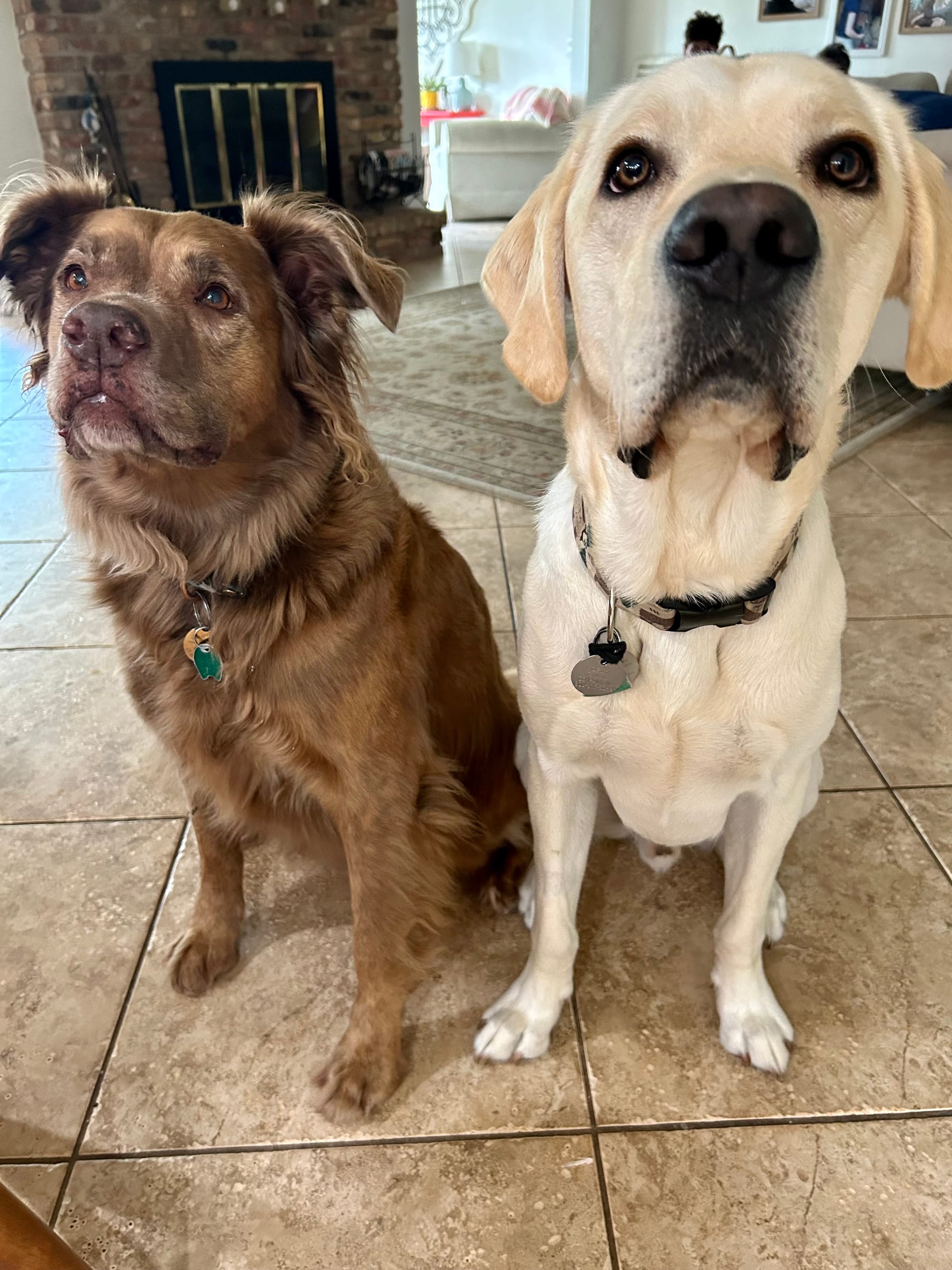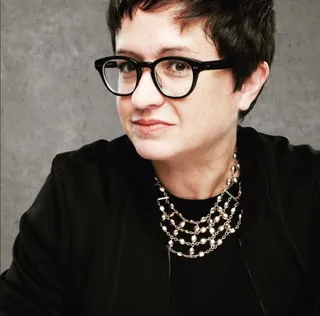Music and Mind

When you need someone to sing at presidential inaugurations, royal birthdays, Nobel Prize ceremonies, Super Bowls, or other special events, acclaimed soprano Renee Fleming is your go-to diva. The five-time Grammy-winner's singing repertoire includes more than 50 of opera's greatest roles, jazz standards, folk songs, show tunes, and a stint singing in elvish for the "Lord of the Rings: The Return of the King" soundtrack. However, no matter what she's sung and where's she has sung it, no matter what accolades she has earned, and no matter how many audiences she has moved to tears, Fleming once fought a battle with stage fright and somatic pain that was so debilitating it almost upended her career. Her experience getting through this sparked her interest in the mind-body connection, and ultimately led to her interest in exploring how to harness the arts for health and wellness.
Last week, Fleming was in Atlanta for two performances with the Atlanta Symphony Orchestra, and a panel discussion with Dr. Sanjay Gupta and other experts that was centered on her new book "Music and Mind." I attended the panel discussion and thought it was fascinating, thought-provoking, and at turns delightfully strange and laugh-out-loud funny. Though the research on the health and wellness benefits of the arts is not new, it had been dismissed as soft science until MRI technology empowered researchers to study how music impacts the brain. Fleming spent two hours in an MRI for one of these studies, which looked at her brain activity when she was listening to music, singing, and thinking about singing. Regardless of what she was doing, the study showed that these activities impacted almost every known part of her brain.
So what does that mean? It depends on what you're looking for. For example, singing stimulates the vagus nerve, which, among other things, is responsible for regulating mood. When you sing – especially when you sing loudly – it requires deep breathing. That, coupled with vocal cord vibrations, sends calming signals to your brain, which makes you feel better. Though I never could explain the reason why I suddenly felt I needed to take voice lessons while I lived in Baton Rouge, I can tell you that I felt warm and fuzzy while I waited for my kid to finish a weekly lesson. Because the instructor was in demand, and because the kid eventually had multiple school conflicts that made it difficult to keep that spot, I told myself I was stepping in to make sure that place was retained. Ultimately, I realized that I was lying to myself. I was stepping in to take those weekly lessons because I liked the challenge and liked the way I was pushing myself to learn how to sing everything from show tunes, to classic jazz to even French opera. I was never going to win any Grammys or Tonys doing what I did. But I knew that taking these lessons made me feel good, and even confident, which was a very good thing, especially because I was about to go out on my first book tour and just thinking about that was enough to make me bite my nails.
So there is the mood aspect of music's benefits. There is also the memory component. Studies have shown that music memory is the last to go in Alzheimer's patients, and so when they hear a song that was once meaningful to them, they are able to remember where they were when they first heard it and how it made them feel.
These are just a couple of examples, in a field of research that is chock full of them.
If arts therapy is beneficial – and noninvasive – then why isn't it used more in clinical settings, and funded by healthcare to boot? The panel widely acknowledged that the healthcare system needs research validation in all that it does. It needs more data on how music works on the brain, and better information on how to dose it adequately. Not all music resonates with patients in the same way, so it will take time to figure out how to address that. However, now that the National Institutes of Health is funding research about art and healing, Fleming hopes that these modalities will become embedded in our healthcare system in the next five years.
A few other takeaways:
- When the panel was asked about what music helped them get through hard times, one member said "Metallica," a tidbit I immediately shared with my Metallica-loving sister. Overall, jazz seemed to be the most common curative among the experts.
- As you might expect, more research needs to be done about how certain treatments impact women and people of color.
- Sanjay Gupta plays the accordion, which Fleming noted was a very complicated instrument. Why the accordion? Gupta's parents loved Bollywood films, which feature accordion music prominently. As soon as Gupta was old enough, his father decided that he would take up the free-reed aerophone...for old time's sake, I suppose.
- Renee Fleming's daughters are apparently very good singers, but (ominously) "they know too much." So one is a doctor, and the other does casting for Marvel films.
- One Emory researcher is using music to guide subjects through a study involving psychedelic-assisted therapy. A handful of people offered themselves up for scientific research Friday night, one of those "joking, but not joking" kind of situations.
- If you played or play a musical instrument (I think that includes singing), you did yourself a service. Studies of elderly twins show that the ones who played musical instruments did not struggle with Alzheimer's or other types of dementia. In short: being a band nerd pays off in the long run. I love that for me.
- It's important to find the musical genre and era that a patient likes to best facilitate the healing process. Listening to Nile Rodgers or Duran Duran definitely brings me joy, for example, while a quiet evening with Ella Fitzgerald is sometimes just what the doctor ordered.
- There is also the aspect of music being the thing we turn to when we need to get something done, whether it's chores, or taxes, or cooking dinner, or a master's thesis.
There's a lot to explore and discuss here, and as I work my way through Fleming's new book, I'll share other things that you might find interesting in the coming weeks. I feel like in this weird and dark moment we're in, we need music and beauty now more than ever to help us survive and thrive.
Writing Prompt
Is there a particular song or songs that you associate with a major moment in your life? What was the moment and what were those songs? How did those songs represent the time, help you get through it, and so on? Is there a song that brings up something so painful or embarrassing for you that you don't want to hear it ever again? If so, what is that memory and how or why does the song remind you of it?
Oh, and, if you karaoke...what's your go-to tune or tunes? I'm not sure if I want you to write about it, or just tell me...up to you. But also pretty please, tell me.
Public Service Announcement
I am not the most technologically literate person on the planet. So when I set up this newsletter, I thought that I had everything situated so that your lovely messages would come directly to me. This was not entirely so. Yes, I am notified when you leave a comment, but your emails have been going Lord-knows-where. Now that I know this is going on, I want you to know that if you emailed me, I haven't been ignoring you. I'm just, uh, dumb, I guess. But now I think I have this fixed. Just so you know...
Boots Buddies of the Week

Now that I've gotten that off my chest, Boots got a wonderful email from Kelley, who introduced her pups to him, and paid homage to the late, great Murray the Good Boy. Here's what Kelley had to say:
Hey Boots!
I’ve got a pair of pooches who would love to join you for a good backyard romp. The first is the long-distance, shoulda-been buddy to the brick-loving canine who laid the path home for you. Your people adored their first furry friend so much that your mom and I dreamed up a budding romance between Murray and Molly, my 10-year-old, 75 lb., auburn multi-breed Golden wannabe. Molly’s getting gray in the face but can still stalk a squirrel and race with now-grown children like nobody’s business – when she’s not napping at my feet. She gets along with
almost every dog but loves their humans even more. And if your mom harps on your exuberance, remind her that your predecessor had some quirks too (see “brick-loving”).
Molly’s sometimes-companion of the last 15 months is Filbert, a Golden/Labrador cross who embodies the very idea of an annoying little brother, despite being head and shoulders taller than Molly. Filly lives with Molly’s human sister at college and is technically owned by an organization called Canine Companions, which provides trained service dogs, free of charge (thanks in part to volunteer puppy raisers who teach house manners and 30 basic commands from 8 weeks to about a year-and-a- half) to individuals with a range of challenges. Next month Filly moves on to professional training, where he will live in a kennel of peers for at least six
months, becoming accustomed to things like wheelchairs, doctor’s appointments, new situations, and people of all ages as he learns skills to perform specific tasks and provide companionship to people who need a friend. Don’t let his important job description fool you, Filly is silly. He leaps like a deer, sometimes directly onto Molly, usually with some manner of squeaky toy in his mouth. He watches his puppy raiser like a hawk and likes nothing better than taking a nap in her bed. He’s going to make a great friend to someone who needs him, but a little piece of him will live forever in our hearts and family lore.
Now tell your mom it’s time for a road trip for a playdate!
Let's make this happen, Kelley!
Do you have a special animal friend in your life that you'd like to introduce to Boots? Please send an email with your pet's photo, an origin story/bit about what makes them so special, and why they might get on well with my little hell on wheels and I'll feature your pal in a coming letter.
What I'm enjoying: For the second straight year, I'm judging the features category for the Association of Alternative News Media. I've got my work cut out for me. There's more than sixty stories to consider, and all of them are so damn good.
What I'll live with (I guess): Atlanta United tied Philadelphia last weekend, so they only walked away with one point instead of the three I wanted. Maybe they can grab three this weekend against FC Cincinnati.
What I'm watching: "Ripley" on Netflix. This story was meant to be filmed a. this beautifully and b. in black and white. It's noir-ish and perfect and Andrew Scott (a.k.a. the sexy priest from "Fleabag") is the super-creepy Tom Ripley we deserve.
What I'd love to get my hands on: A copy of the documentary "Reinventing Mirazur," about how Italo-Argentine chef Mauro Colagreco changed everything about his multi-Michelin-starred restaurant after the COVID-19 pandemic. Having interviewed him recently, I'm fascinated by how his travels, training and ideals come together in his work and set a new standard for the way chefs can approach their profession. Really interesting guy...
Where I hope you'll donate this week (if you can): Sweet Filbert wants you to give what you can to Canine Companions, which provides well-trained (and free) beasts like him to children and adults who are living with a wide range of challenges. Their mission isn't possible without the kindness of strangers. Won't you help someone find their own Filbert?
Paige Bowers Newsletter
Join the newsletter to receive the latest updates in your inbox.

